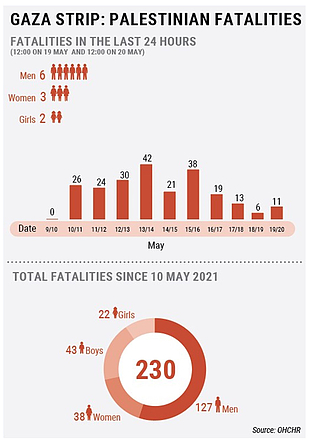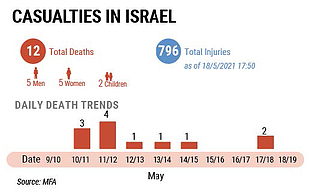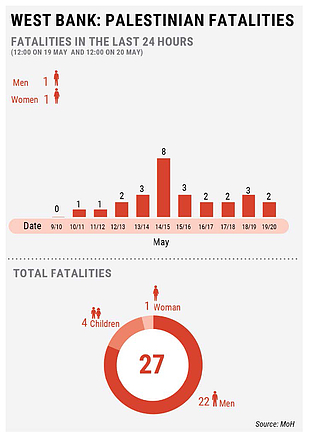Escalation in the Gaza Strip, the West Bank and Israel | Flash Update #10 covering 12:00 19 May – 12:00 20 May
- Hostilities between Israeli forces and armed groups in Gaza continued for the eleventh day. In the last 24 hours, in the context of hostilities in Gaza, the Office of the High Commissioner of Human Rights (OHCHR) verified that eleven Palestinians were killed, including at least seven civilians, two of whom were girls.1 Another 190 people were injured.
- Hostilities have also resulted in additional displacement of Palestinians, bringing the cumulative number of internally displaced persons (IDPs) to about 91,000, including 66,000 seeking protection in 58 UNRWA schools across Gaza and over 25,000 staying with host families.
- Two Palestinians were killed and 61 were injured in the West Bank.
- In a message to the General Assembly, the Secretary-General reiterated his call on all sides for an immediate ceasefire, pointing out that “if there is a hell on earth, it is the lives of children in Gaza today”. He also urged the Israeli authorities “to abide by the laws governing armed conflict, including the proportionate use of force”, and “Hamas and other militant groups to stop the indiscriminate launching of rockets and mortars from highly populated civilian neighbourhoods into civilian population centres in Israel.”
Key asks
The fighting must stop immediately.
Until a ceasefire is reached, all parties must agree to a ‘humanitarian pause’, to ensure access into and out of Gaza for humanitarian staff and critical goods. This includes the creation of secure conditions so that the relevant crossings can be opened. Humanitarian Corridors inside Gaza must be agreed and respected to allow safe movement for the delivery of assistance.
Situation overview
Casualties: Gaza and Israel
 Overnight, Israeli forces carried out tens of strikes from the air, the land and the sea across the Gaza Strip, reportedly targeting armed groups and related infrastructure, especially tunnels, and the residences of armed group members.
Overnight, Israeli forces carried out tens of strikes from the air, the land and the sea across the Gaza Strip, reportedly targeting armed groups and related infrastructure, especially tunnels, and the residences of armed group members.
On 19 May, one Israeli missile hit a house in Deir Al Balah, killing a 35-year-old man with physical disability, his pregnant 38-year-old wife, and their 2-year-old daughter. In the same locality, another Israeli missile hit an apartment killing a 35-year-old woman, and injuring her husband and her brother-in-law. On 20 May, an Israeli missile hit a three-storey residential building in Khan Younis with 30 people, including 10 children and six women, inside: the missile did not explode, but three civilians, including two children were injured. A 63-year-old famer was shot and killed by Israeli forces positioned at the perimeter fence, while working his land in the Johr Ad Deek area.
Under international humanitarian law (IHL), only attacks against objects which by their nature, location, purpose or use make an effective contribution to military action or whose destruction offers a definite military advantage are lawful. Targeting civilian objects, including governmental buildings, homes and civilian infrastructure is absolutely prohibited in any circumstances. Attacks against military objects expected to cause a disproportionate harm to civilians or civilian objects are also forbidden.
 Since 10 May, OHCHR has verified that 230 Palestinians, including 65 children, 38 women (of whom four were pregnant) and 127 men, have been killed in Gaza. The overall number includes three people with disabilities, including a child. According to OHCHR, at least 128 of those killed were civilians.2 At least 218, including 62 children, were seemingly killed by Israeli forces. Some of the Palestinian casualties in Gaza may have resulted from Palestinian rockets falling short. At least 14 families in Gaza have lost three or more family members in the same incident, for a total of 77 fatalities.
Since 10 May, OHCHR has verified that 230 Palestinians, including 65 children, 38 women (of whom four were pregnant) and 127 men, have been killed in Gaza. The overall number includes three people with disabilities, including a child. According to OHCHR, at least 128 of those killed were civilians.2 At least 218, including 62 children, were seemingly killed by Israeli forces. Some of the Palestinian casualties in Gaza may have resulted from Palestinian rockets falling short. At least 14 families in Gaza have lost three or more family members in the same incident, for a total of 77 fatalities.
According to the Ministry of Health, 1,760 Palestinians have been injured, including 540 children, 361 women (of whom three were pregnant) and 859 men since the outbreak of hostilities.
Palestinian armed groups have continued firing of rockets and mortars into Israel, with an undeclared five-hour-long pause overnight. Many of the rockets were intercepted by the ‘Iron Dome’ defence system, resulting in no fatalities during the reporting period. A total of twelve people, including one soldier, were killed by Palestinian rocket fire or when running for shelter during such strikes, and approximately 800 have been injured since the start of the hostilities, according to Israeli sources.
Indiscriminate launching of rockets and mortars from highly populated in Gaza towards residential areas in Israel violates international humanitarian law.
Gaza
Infrastructure and Services
Hostilities have further damaged essential infrastructure, resulting in an additional decline in public access to basic services across the Gaza Strip. According to the Ministry of Public Works and Housing, since the start of the escalation, 258 buildings, comprising 1,042 housing and commercial units, have been destroyed. In addition, 769 units have been severely damaged, and rendered uninhabitable. An additional 14,536 units have suffered minor damage.
The Education Cluster reports that 51 education facilities, including 46 schools, two kindergartens, an UNRWA vocational training centre, a Ministry of Education facility and the premises of the Islamic University have been damaged since the start of the escalation. All schools in Gaza remain closed for the fifth consecutive day following the Eid holidays, affecting more than 591,000 children.
According to the Health Cluster, six hospitals and eleven primary healthcare centres have been damaged, with one centre suffering severe damage. One hospital is not functioning due to lack of electricity for the fifth successive day. On 20 May, the Ministry of Health (MoH) in coordination with UNRWA started COVID19 testing among displaced people hosted in UNRWA schools, in addition to those leaving for Egypt.
The Gaza Electricity Distribution Company (GEDCO) has reported additional damage to feeder lines and networks, with an average power supply of 7 hours a day throughout Gaza. The current electricity supply from all sources is about 100 megawatts (MW), far short of the approximately 400 MW needed in Gaza severely disrupting the provision of basic service. GEDCO teams could not access many of the damaged sites due to the lack of coordination with Israeli side and the resulting insecurity.
In the past 24 hours, the main water transmission pipeline supplying water to more than 50,000 people in Khan Younis, and the sewer pressure pipeline serving more than 60,000 people in Beit Lahiya, were damaged during airstrikes. The Palestinian Water Authority (PWA) and the public utility company reported that their capacity to repair infrastructure and equipment is severely undermined due to the shortage of spare parts, materials and tools, and because of safety concerns. One of the two landfills in Gaza is still not operational, resulting in waste accumulating in urban areas. According to the WASH Cluster, due to lack of power supply, three main desalination plants providing drinking water for more than 400,000 people have suspended operation and so have sewage treatment facilities, resulting in more than 100,000 cubic metres of untreated or partially treated wastewater are being discharged to the sea daily. In total, an estimated 800,000 people are lacking regular access to piped water.
Displacement
According to UNRWA, as of the morning of 20 May, over 66,000 IDPs are seeking protection in 58 UNRWA schools, including in 23 designated emergency shelters (DES), still not officially open as such. Another 25,390 people are staying with host families, according to the Ministry of Social Development (MoSD).
Using available resources, UNRWA is helping those seeking shelter in its schools, by providing potable water, sanitary facilities, and electricity during power outages through generators, personal protective equipment to help contain COVID-19 and shaded school yards.
On 20 May, UNRWA launched a Flash Appeal seeking US$38 million to respond to the immediate needs of IDPs for an initial period of 30 days.
Crossings
The Israeli-controlled Erez passenger crossing and Kerem Shalom goods crossing remained closed. The latter temporarily opened on 18 May for the passage of humanitarian and commercial cargo, allowing only five of the 24 humanitarian trucks scheduled to cross into Gaza. Essential humanitarian cargo has been approved by Israeli authorities and ready to enter once the crossings reopen. The supplies include food, COVID-19 vaccines, first aid kits, medical disposables and drugs, including emergency medicines; as well as fire extinguishers and fuel, among other items.
The Rafah crossing with Egypt is open for passengers in both directions as normal. The goods that entered from Egypt through this crossing during the reporting period included mainly food, fodder and fuel. The Israeli authorities continue to prohibit all fishing activity off the Gaza coast.
West Bank, including East Jerusalem
 Two Palestinians died during the reporting period in the West Bank, including a Palestinian man who succumbed to his injuries sustained in clashes with Israeli forces in Jenin on 18 May, and a 40-year-old
Two Palestinians died during the reporting period in the West Bank, including a Palestinian man who succumbed to his injuries sustained in clashes with Israeli forces in Jenin on 18 May, and a 40-year-old
Palestinian woman who was shot and killed in the Israeli-controlled area of Hebron city, reportedly after she opened fire at soldiers staffing a checkpoint; no Israeli injuries were reported.
Overall, the number and intensity of protests and clashes between Palestinians and Israeli forces declined, but 61 people were still injured. Some of the clashes were triggered during search-and-arrest operations, where Israeli forces arrested 40 Palestinians. According to OHCHR, these arrests have raised concerns of arbitrary detention and violation of the right to freedom of expression and assembly.
Since 10 May, 27 Palestinians were killed and 6,370 were injured by Israeli forces across the West Bank in protests, clashes and attacks. Of all the injuries recorded, about 60 per cent required medical treatment after inhaling tear gas, 25 per cent were hit by rubber bullets and 11 per cent were shot with live ammunition.
Notes
1. Includes those that have died during the past 24 hours due to injuries previously sustained.
2. Those reported as civilians are individuals who are not members of armed forces and were not directly participating in hostilities at the time that they were killed. Whether an individual is qualified as civilian or not, has no bearing on the legality of the killing. Data is based on information from at least three independent and reliable sources at the time of reporting. As further verified information becomes available, the number of fatalities in total, and in any of the categories, may change.
Humanitarian response & ongoing needs
Protection
Gaza: According to the Protection Cluster, there is growing psychological distress among those displaced by the ongoing hostilities, in addition to material needs and an increased risk of Explosive Remnants of War (ERW) contamination. The Protection Cluster continues to assess the impact of the crisis on vulnerable groups, by monitoring, documenting, and reporting cases of suspected violations of international law. Partners are delivering a number of services, including remote psycho-social counselling; ERW risk awareness; messaging through online platforms and social media; online information, emergency risk education for community members, responding to the needs of people with disability (PWD); psychological first aid, case management and outreach to IDP families through community protection committees. Protection partners report serious physical and psychological symptoms appearing in children under severe distress due to the unabated strikes for a consecutive ten days. Partners warn that without rapid provision of psycho-social support, many may develop severe mental health disorders. All 12 UNICEF-supported Family Centres are currently not operating but providing ad-hoc recreational support activities for children. The Red Crescent Society safe space for women and girls in Jabalya, one of the main safe spaces in Gaza, has been damaged.
West Bank, including East Jerusalem: Cluster partners are monitoring and documenting cases of suspected violations of international law, and providing legal aid and child protection services, as well as mental health and psycho-social support (MHPSS). Of ongoing concern is the suspected excessive use of force by Israeli forces including live ammunition shot at against protesters and in other clashes, including during search and arrest operations. Partners are receiving an increasing number of requests to trace and locate Palestinian children detained by Israeli forces in the West Bank. Cluster partners continue to provide remote MHPSS and legal aid for those detained.
Health
Gaza: Since the start of the hostilities, 18 healthcare facilities have sustained damage, and one NGO hospital is not operating due to shortage of fuel. Partners maintain their response efforts in treating injuries, despite the infrastructural damage which is hindering access to health facilities. The evacuation of injured people remains a challenge, due to damaged infrastructure and rubble. Some primary healthcare services are currently provided to IDPs in a number of shelters. As of today, MoH central testing laboratory for PRC COVID-19 testing will resume its functions following a three-day shutdown due to the damage sustained on 17 May.
West Bank, including East Jerusalem: Across the West Bank, including East Jerusalem, Cluster partners and community volunteers continue treating the injured in the field and referring those severely injured to hospital.
Shelter
Gaza: According to the Ministry of Public Works and Housing, hostilities have resulted in 258 buildings destroyed, comprising 1,042 housing units and commercial facilities, in addition to 769 units with severe damage (uninhabitable) and 13,536 with minor damage. Partners are assessing the damage and supporting the repair of homes, giving priority to vulnerable groups. According to the Ministry of Social Development (MoSD), 2,807 families comprising 14,259 people have been directly affected. MoSD indicated that 4,297 internally displaced families are staying in host families, for total of 25,390 individuals (as of yesterday). Shelter Cluster partners are supporting 700 IDP families (3,671 individuals) with nonfood items (NFIs), including bedding sets, hygiene kits and dignity items, although needs are constantly increasing. Cash vouchers are provided to 1,000 families (5,300 people). There is an ongoing cash assistance for 295 IDP families, whose houses were destroyed or damaged beyond repair.
Water, Sanitation and Hygiene (WASH)
Gaza: In the past 24 hours, water and sanitation infrastructure were damaged by seven strikes, including the main water transmission pipeline supplying water to more than 50,000 people in Khan Younis, and the sewer pressure pipeline serving more than 60,000 people in Beit Lahiya. Since the start of the hostilities, 93 strikes damaging WASH infrastructure were recorded. WASH Cluster partners are coordinating with PWA to support the service providers with emergency maintenance materials and tools to restore the water and sanitation services in the affected areas.
Education
Gaza: Some 51 education facilities, including 46 schools, have suffered damage since the start of the hostilities. All schools are closed for a fifth consecutive day, impeding access to education for 591,685 students (51 per cent of whom are girls). The Education Cluster expect that education will not be provided, neither face-to-face, nor remotely while the hostilities are ongoing.
West Bank, including East Jerusalem: On 19 May, the Ministry of Education (MoE) re-opened schools in the West Bank, including East Jerusalem, with the exception of some schools in Area C and East Jerusalem directly affected by the demonstrations and clashes.
Food Security
Gaza: Cluster partners have reported an increasing fear among farmers who attempt to access their agricultural lands, particularly following the killing of a farmer by Israeli forces on 19 May. Reduced farming activities, available water for irrigation purposes and shortages of agricultural inputs are resulting in a decreased quality of agricultural products. For the tenth day, there is a full closure of the sea, leading to the complete disruption of fishing activities and daily affecting 3,600 fisher households. The World Food Programme (WFP) has supported 95,955 people affected by the ongoing crisis. In addition, WFP started pre-positioning ready-to-eat food for some 100,000 IDPs in UNRWA shelters.












